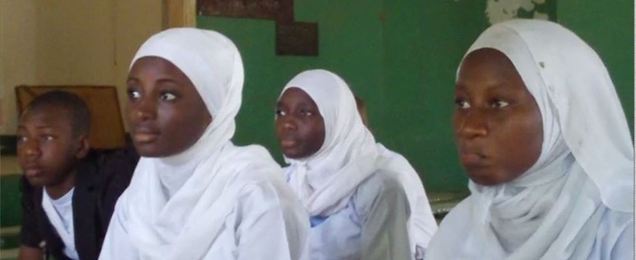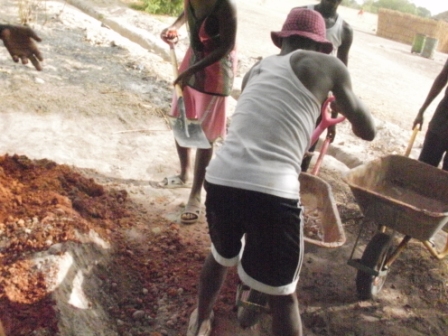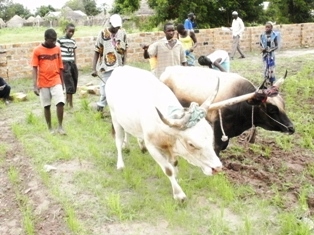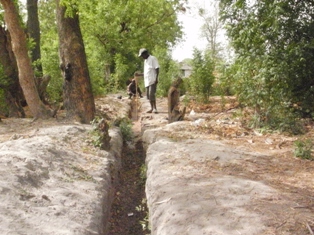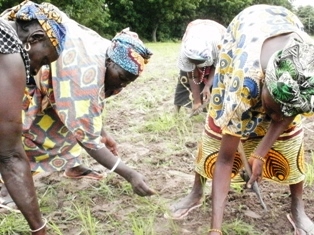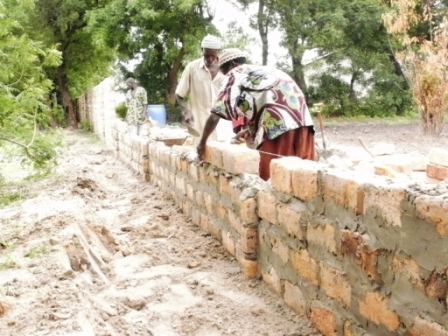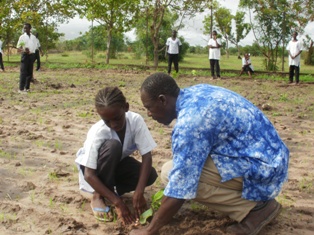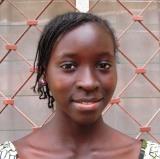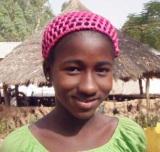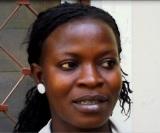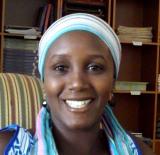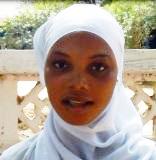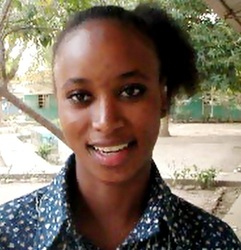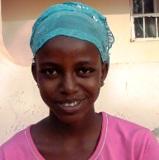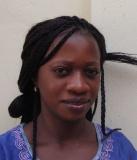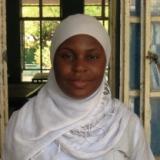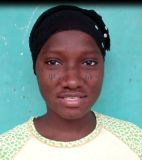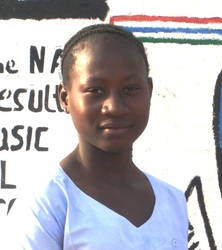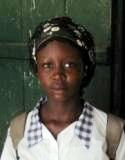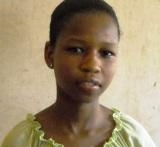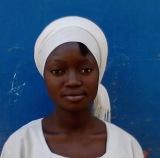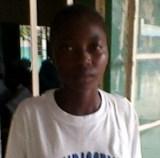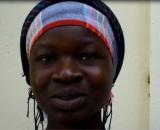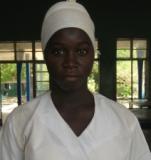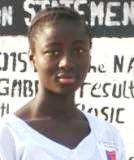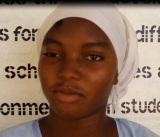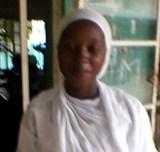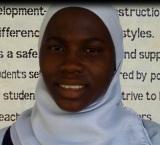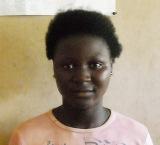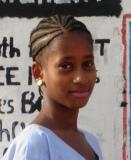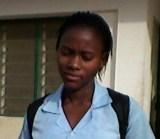GambiaRising posts weekly updates on students and projects on our FaceBook page.
We also send updates every few weeks by email. Here are links to these updates:
Coming Through When Needed (June 30, 2024)
Housing Teachers, and Hoping for Help (June, 2024)
Not Mother's Day 2024 (May, 2024)
Books + Cloth = Changing Lives (April, 2024)
The Kindness of Neighbors (March, 2024)
Oh My, They've Grown (February, 2024)
On the Ground 2024 (January, 2024 trip report)
Holiday Video (December, 2023)
A Holiday of Hope (December, 2023)
What Two People Can Do (November, 2023)
Ebrima and Mariama Do Their Part (October 28, 2023)
Thirteen Years Later (September, 2023)
Unintended Opportunities (August, 2023)
One Girl's Life, Changed (July, 2023)
One Teacher, 104 Lives (June, 2023)
Not Mothers, Not Yet (May, 2023)
Mariama is Making Her Mark (April, 2023)
They're Going Even Further (March, 2023)
A Family Visit (January, 2023)
A Year of Miracles (December, 2022)
Ripples in Still Water (November, 2022)
Young and Older, Deserving a Chance (Oct. 23, 2022)
From Tragedy to Hope (Sept. 24, 2022)
And after 12 grade? (August 31, 2022)
The teachers and mothers of Sinchu Njegundi (August 3, 2022)
A New Headmistress Asks for Help (July 12, 2022)
Education and Climate - The Economist, June 4, 2022
Dramatic Change in Kuli Kunda (June 4, 2022)
Fanta and Jakong (May 18, 2022)
Not Mothers, Not Yet (May 1, 2022)
Not in Our Wildest Dreams (Sare Wuring Revisited) (April 13, 2022)
Modest Beginnings and Results to be Proud of (March 23, 2022)
Sewing for Change (February 23, 2022)
Off the Track (Trip Report) (February 8, 2022)
On to an Important New Year (January 25, 2022)
Holiday Greetings (December 23, 2021)
Changing Lives in Sare Sarjo (December 12, 2021)
Opportunity, Leadership, and Democracy (November 21, 2021)
Three Generations in Ten Years (November 3, 2021)
Who Will Help the Peace Corps Training Villages? (October 16, 2021)
Christiana Would Not Give Up (September 1, 2021)
Mariama is at Notre Dame. It's a Long Way from Sahadatou (August 21, 2021)
Immediate Needs, Long-Term Effects (August 7, 2021)
Ndey Makes Her Case (July 18, 2021)
Getting Trained and Giving Back (June 19, 2021)
A Short History of GambiaRising (May 26, 2021)
Some Wonderful News (March 27, 2021)
Even in March (March 6, 2021)
Changing the Future (February 14, 2021)
... and Beyond (January 12, 2021)
A Time for Good News (December 20, 2020)
This is What Hope Looks Like (November 17, 2020)
A School Where There Had Been None (November 3, 2020)
Going Back for Those Left Behind (October 13, 2020)
Success, and Need (September 15, 2020)
Stepping Up in Sare Samba (August 18. 2020)
Staying Hopeful, but Needing Help (July 21, 2020)
Walking Together (June 20, 2020)
Not Mothers, Not Yet (May 10, 2020)
Just Add Cement (April 7, 2020)
A Little Good News (March 24, 2020)
Sulayman Walks to School (or Used to) (March 5, 2020)
But What About the Stars? (February 18, 2020)
Trip Report (I Wish You Could Have Been There) (February 1, 2020)
Action, and the Effect (January 5, 2020)
Let's Celebrate These! (December 17, 2019)
Four Girls, Four Remarkable Stories (November 23, 2019)
Making a Difference (November 3, 2019)
Hopes and Dreams (October 5, 2019)
Effective Giving (August 10, 2019)
Changing Lives, Together (July 13, 2019)
Sewing for Change (June 29, 2019)
What is at Stake: Just too young (June 16, 2019)
Going to School: "It is not easy." (May, 2019)
From Westfield to Iowa City (April, 2019)
Didn't Want to Marry, ... and a Grass-roofed School
A Miracle in Korrop (March, 2019)
Just Back from The Gambia (January 27, 2019)
Celebrating the Students (January 5, 2019)
What We Did Together (December 2018)
What a Dilemma! (November 2018)
They're Back in School (October 27, 2018)
A New School Year... and bumpy rides (October 3, 2018)
Two Ways This Could Go
Annual Campaign Appeal
GambiaRising's Annual Report for the 2017-18 School Year: What We Did Together
In this busy world, we try not to over-communicate. But once a year, we write a longer report to summarize what our donors and our Gambian team accomplished together. You can read this year's here.
They Keep Surprising Us
It is graduation season in The Gambia and some of our students are producing remarkable results. You can read about them here.
Independence !
For young Gambian women, the chance to get an education gives them greater control over their lives. You might even call it independence. Read more here.
Two Young Gambian Women, Given a Chance
You can read about what two of our scholarship students have done with the chance they were given by our donors here.
Celebrating Not-Mother's Day
Our primary mission is supporting Gambian girls to stay in school. Especially those of marrying age. Read about these brave young women here.
Trip Report: One Year After the Return of Democracy
A February 2018 report from The Gambia from our Managing Trustee can be found here.
What the Finish Line Looks Like
A January 2018 report on our year's end activities, and four remarkable students can be found here.
Holiday Greetings 2017
Here are just some of those whose lives we have completely changed, together...
The Other Victims of the Back Way
A note about what happens to families when their fathers decide to try to go to Europe,... and don't make it. To read the note, click on the title above, or here.
The School Year Begins
A note about some of the new students back in school with support from GambiaRising donors, and some risks we are taking To read the note, click on the title above, or here.
Just Days from Now, Schools Will Open
A note about the new school year in The Gambia, and the stories of 12 young Gambians on our waiting list. To read this report, click on the title above, or here.
Bringing Hope - GambiaRising's Annual Report
At the close of the 2016-17 school year, an overview of our program, our organization, challenges, and the road ahead. To read this report, click on the title above, or here.
What a Time to Visit The Gambia!
A report from our Managing Trustee on a post-election visit to the places we work, and the people we work with.
With Change Comes Hope - Let's Do Our Part
The dramatic events surrounding the election of a new coalition President has led to a surge in expectations in The Gambia. How can we help?
Support, over Time
When we promise to support a child's education, we do everything we can to keep that promise, long term. Here are some of those we've been backing for a while. Click on the link above to read more.
Farming for Education, Education for Farming
While our focus is on providing scholarships to those who, without them, will not be able to go to school, where we can, we also work to improve the quality and relevance of their education. Especially, since most of our students are farm children, on improving the teaching of agriculture in rural schools where we work.
Annual Report -
Here's what we did together this school year
At the end of the 2015-16 school year, we summarize our program and its results for the year. Click on the link above to read this report, which was sent to our donors.
But What if There is No School to Go To?
After finishing 9th grade, the students around Fula Bantang, in the lower Central River Region, had no senior secondary school closer than 15 miles away. So we launched a special campaign to begin building a senior secondary school with the community, one grade per year. Click on the title above to read a progress report.
A Donkey-Cart School Bus?
When our Community Coordinator in Kaimoh discovered the twin sister of a 1st grade student had never walked, she had to take action.
Coming to America (for graduate school!)
Fatou Kineh Ndow's story didn't stop when she was accepted to study math at the University of The Gambia. Nor when she graduated summa cum laude and was class valedictorian. Now she is on her way to Ohio University to study for her Master's Degree. To read more, click on the link above.
Pacharr School has mobilized the community
To read about the way GambiaRising collaborated with the remote village of Pacharr to create a school that now serves more than 300 children, please click the link above.
"May I speak with you?" she asked To read about one of GambiaRising's neighborhood coordinators, and the effect he is having, click the link above.
Njie Kunda in Person: better than I dared to hope
To read about an in-person visit to the new Njie Kunda School, click on the title above.
Njie Kunda Builds itself a School
To read the remarkable story about how Njie Kunda got a school, click on the title above.
Back in School, thanks to you
To read our October, 2015 report on the new school year in The Gambia, click on the title above.
The 2014-15 School Year Just Ended - Our Annual Report
To read our annual report to our stakeholders, please click on the title above ("The 2014-14 School Year Just Ended...")
To read our annual report to our stakeholders, please click on the title above ("The 2014-14 School Year Just Ended...")
No Child Left Behind, Fula Bantang Style
To read about one community's inspiring effort to make sure all its children get an education, click on the No Child Left Behind title (above).
A Community Builds a School
Click on the title above to read an inspiring report on our South Bank Coordinator's work with the community of Pacharr to build itself a school.
School's Out in The Gambia: a school-year-end report
July, 2014
“Education is an escalator that can change the world….” – Nicholas Kristoff
GambiaRising began while I was Country Director for Peace Corps The Gambia. For technical reasons, just before I arrived Peace Corps Washington had canceled a scholarship fund started by Volunteers, and the Gambian staff fittingly started routing all the applications to my desk. A couple of U.S. friends offered to pay the school fees for several students who had been kicked out of school for non-payment of school fees, and by the time I left they and several others and I were supporting the education of ten students.
When I returned to the U.S. after my 2-1/2 year tour in The Gambia, three returned Peace Corps Volunteers and I formally organized GambiaRising as a charitable trust, were granted 501(c)(3) status by the IRS, and sent out a note to some friends asking them to join us so that more deserving students could be helped. By the end of 2010, we were supporting 26 students.
Since then we have focused on four operating principles:
• A clear focus on scholarships for students who without our help would not be able to stay in school;
• Using 100% of all donated funds directly for student support Marilyn and I are paying for our low overhead (which is primarily travel and supplies); everyone in the U.S. and The Gambia working on the program volunteers their time;
• Building the capacity of the on-the-ground organization of Gambians so that those closest to the students are making the key operational decisions. Father Moses Drammeh is our National Coordinator, Kebba Sanyang (Principal of St. Therese’s School in Fula Bantang) manages all upcountry operations, Lamin Cham at Peace Corps is a vital communication link, liaison with Peace Corps, and IT czar, and Dawda Faye and others at the Catholic Education Secretariat provide invaluable liaison and accounting services with the critical support of the Catholic Education Secretary, Dr. Emil Kujabi. Last but not least, Yaya Sonko, Matthew Gomez, and Ebrima Bah are providing vital help with communications.
• Growing organically through an expanding network of repeat donors, without foundation grants.
Our focus on students most in need has led directly to a natural skewing of the program toward girls, particularly after they reach puberty. This is the age at which girls traditionally are "given in marriage" and it is especially crucial up country, where there are fewer senior secondary schools, and where going to 10th grade usually means leaving home, boarding with distant relatives or friends of family, and attending a school with few or no others from your home village. It is also the age at which many families feel they have "done enough" for their daughter, who traditionally after marriage will join her husband's family. 80% of the students we supported in senior secondary school this school year were girls.
We are very grateful that as we have grown the capacity of the organization, the number and consistency of donors has kept pace. In 2013, 56 people donated $100 or more to GambiaRising. More than half of those made monthly donations of $12.50 to $50. These relatively small monthly donations, because of their consistency, allow us to commit to support a student before we have all the funds they will need. And these smaller donations really add up: our current run rate is $7,000 per year. We are so hopeful that this number will increase in the coming school year.
We increasingly have focused our efforts in the U.S. on communication, fund raising, setting operational principles, and oversight. The generosity of friends (and friends of friends) expanded our annual donations to $37,085 last year. By focusing on helping those most in need, careful allocation of funds, and aided by a weaker Gambian dalasi, we were able to expand the number of students supported in 9th grade and higher by 22% last year, and, helped by a World Bank subsidy of school fees in grades 1-6, which cut the cost of supporting a student in those grades in half, we were able to support nearly twice as many students in grades K through 9. In all, 247 students were able to stay in school in the just-completed school year who would not have been able to without our support. And 3/4 of those were girls.
As you can see, we are getting a lot done with the funds we receive. Part of this is focus, part of this is zero overhead, and part of this is excellent and selfless dedication and prudent attention to detail on the part of our Gambian team.
As you can also see, we are counting on those who have been supporting us to continue to do so. But times are not getting easier in The Gambia and we know we are going to have more applications than ever in the coming school year. During the last school year we added 54 students to our rolls after November 30th alone. We try to keep a low profile and avoid publicity but at schools where we already support students, Principals and teachers inevitably call to tell us of a promising student about to be expelled for non-payment of fees. Or, in one case, a college student we supported found four students in his neighborhood not in school and, with our backing, got them all enrolled. To keep costs down, his brother, an apprentice tailor, even made their uniforms – we simply purchased the cloth.
I really hesitate to use the words “we” and “our” in writing this update, since I see “us” as an efficient and honest channel between donors and the student(s) they support. It is really all about the students, and we seek to simply be effective conduits. We try whenever possible to put a face on where the money is going and what it is doing, because the students are what everything is about. They were simply born in the wrong place, and they deserve an education. We are not changing the conditions in which they live, not shortening the distance they have to walk to get to school, not lowering the ever-increasing heat of the west Africa sun (it was 102° in Janjanbureh last week). But together, we are giving them a chance to grow up, learn to read, write, do math, learn about their bodies and about the world, spend time with their peers, gain self-esteem, and simply have the things that as Americans we take for granted as basic human rights. They, and others on our too-long waiting list, are counting on us.
On behalf of these wonderful young people, I invite you to join us in the coming school year and to give someone who has nowhere else to turn, a chance to go to school.
Mike McConnell
Managing Trustee
“Education is an escalator that can change the world….” – Nicholas Kristoff
GambiaRising began while I was Country Director for Peace Corps The Gambia. For technical reasons, just before I arrived Peace Corps Washington had canceled a scholarship fund started by Volunteers, and the Gambian staff fittingly started routing all the applications to my desk. A couple of U.S. friends offered to pay the school fees for several students who had been kicked out of school for non-payment of school fees, and by the time I left they and several others and I were supporting the education of ten students.
When I returned to the U.S. after my 2-1/2 year tour in The Gambia, three returned Peace Corps Volunteers and I formally organized GambiaRising as a charitable trust, were granted 501(c)(3) status by the IRS, and sent out a note to some friends asking them to join us so that more deserving students could be helped. By the end of 2010, we were supporting 26 students.
Since then we have focused on four operating principles:
• A clear focus on scholarships for students who without our help would not be able to stay in school;
• Using 100% of all donated funds directly for student support Marilyn and I are paying for our low overhead (which is primarily travel and supplies); everyone in the U.S. and The Gambia working on the program volunteers their time;
• Building the capacity of the on-the-ground organization of Gambians so that those closest to the students are making the key operational decisions. Father Moses Drammeh is our National Coordinator, Kebba Sanyang (Principal of St. Therese’s School in Fula Bantang) manages all upcountry operations, Lamin Cham at Peace Corps is a vital communication link, liaison with Peace Corps, and IT czar, and Dawda Faye and others at the Catholic Education Secretariat provide invaluable liaison and accounting services with the critical support of the Catholic Education Secretary, Dr. Emil Kujabi. Last but not least, Yaya Sonko, Matthew Gomez, and Ebrima Bah are providing vital help with communications.
• Growing organically through an expanding network of repeat donors, without foundation grants.
Our focus on students most in need has led directly to a natural skewing of the program toward girls, particularly after they reach puberty. This is the age at which girls traditionally are "given in marriage" and it is especially crucial up country, where there are fewer senior secondary schools, and where going to 10th grade usually means leaving home, boarding with distant relatives or friends of family, and attending a school with few or no others from your home village. It is also the age at which many families feel they have "done enough" for their daughter, who traditionally after marriage will join her husband's family. 80% of the students we supported in senior secondary school this school year were girls.
We are very grateful that as we have grown the capacity of the organization, the number and consistency of donors has kept pace. In 2013, 56 people donated $100 or more to GambiaRising. More than half of those made monthly donations of $12.50 to $50. These relatively small monthly donations, because of their consistency, allow us to commit to support a student before we have all the funds they will need. And these smaller donations really add up: our current run rate is $7,000 per year. We are so hopeful that this number will increase in the coming school year.
We increasingly have focused our efforts in the U.S. on communication, fund raising, setting operational principles, and oversight. The generosity of friends (and friends of friends) expanded our annual donations to $37,085 last year. By focusing on helping those most in need, careful allocation of funds, and aided by a weaker Gambian dalasi, we were able to expand the number of students supported in 9th grade and higher by 22% last year, and, helped by a World Bank subsidy of school fees in grades 1-6, which cut the cost of supporting a student in those grades in half, we were able to support nearly twice as many students in grades K through 9. In all, 247 students were able to stay in school in the just-completed school year who would not have been able to without our support. And 3/4 of those were girls.
As you can see, we are getting a lot done with the funds we receive. Part of this is focus, part of this is zero overhead, and part of this is excellent and selfless dedication and prudent attention to detail on the part of our Gambian team.
As you can also see, we are counting on those who have been supporting us to continue to do so. But times are not getting easier in The Gambia and we know we are going to have more applications than ever in the coming school year. During the last school year we added 54 students to our rolls after November 30th alone. We try to keep a low profile and avoid publicity but at schools where we already support students, Principals and teachers inevitably call to tell us of a promising student about to be expelled for non-payment of fees. Or, in one case, a college student we supported found four students in his neighborhood not in school and, with our backing, got them all enrolled. To keep costs down, his brother, an apprentice tailor, even made their uniforms – we simply purchased the cloth.
I really hesitate to use the words “we” and “our” in writing this update, since I see “us” as an efficient and honest channel between donors and the student(s) they support. It is really all about the students, and we seek to simply be effective conduits. We try whenever possible to put a face on where the money is going and what it is doing, because the students are what everything is about. They were simply born in the wrong place, and they deserve an education. We are not changing the conditions in which they live, not shortening the distance they have to walk to get to school, not lowering the ever-increasing heat of the west Africa sun (it was 102° in Janjanbureh last week). But together, we are giving them a chance to grow up, learn to read, write, do math, learn about their bodies and about the world, spend time with their peers, gain self-esteem, and simply have the things that as Americans we take for granted as basic human rights. They, and others on our too-long waiting list, are counting on us.
On behalf of these wonderful young people, I invite you to join us in the coming school year and to give someone who has nowhere else to turn, a chance to go to school.
Mike McConnell
Managing Trustee
Teaching the Teachers
GambiaRising's focus is keeping Gambian students in school, when their families can’t afford to. Especially girls. And especially girls of marrying age.
Inflation is a serious problem in The Gambia, with the Gambian dalasi having fallen in value more than 10% per year in recent years. This has sharply driven up the cost of imported items such as fuel, cement, and… rice, the staple of most diets. The other side of this is coin, however, is that GambiaRising’s funds are buying 10% more dalasis this year than last.
Our commitment to our donors is that 100% of their donations will be used directly to support students, and so when a strong exchange rate or small donations provide a little extra funds, we put them in an emergency fund for mid-term appeals. And this year for the first time, we did one more thing: we gave scholarships to seven “unqualified” teachers to enter the Gambia College teacher training program. Teachers without degrees earn less than $30 per month in The Gambia. With a teacher’s certificate they will earn twice as much. While studying, they continue to teach, and they go to college during summers and every school vacation. But here’s the problem: the cost of the program is half a year’s pay. There is some government assistance for primary school teachers, but not enough, and none for nursery school teachers studying for the Early Childhood Development (ECD) certificate. And so there is a vicious cycle: because you can’t afford to pay for the training, your pay remains too low to support yourself.
Inflation is a serious problem in The Gambia, with the Gambian dalasi having fallen in value more than 10% per year in recent years. This has sharply driven up the cost of imported items such as fuel, cement, and… rice, the staple of most diets. The other side of this is coin, however, is that GambiaRising’s funds are buying 10% more dalasis this year than last.
Our commitment to our donors is that 100% of their donations will be used directly to support students, and so when a strong exchange rate or small donations provide a little extra funds, we put them in an emergency fund for mid-term appeals. And this year for the first time, we did one more thing: we gave scholarships to seven “unqualified” teachers to enter the Gambia College teacher training program. Teachers without degrees earn less than $30 per month in The Gambia. With a teacher’s certificate they will earn twice as much. While studying, they continue to teach, and they go to college during summers and every school vacation. But here’s the problem: the cost of the program is half a year’s pay. There is some government assistance for primary school teachers, but not enough, and none for nursery school teachers studying for the Early Childhood Development (ECD) certificate. And so there is a vicious cycle: because you can’t afford to pay for the training, your pay remains too low to support yourself.

Evalinda
Let me introduce you to Evalinda, who is teaching at the nursery school at St. Michael’s in Njongon, not far from the northwestern border with Senegal, and who thanks to GambiaRising’s donors, is now in the ECD program at Gambia College. She was in the Kombo for classes when I was there in January, and I recorded part of my conversation with her which you can see at http://is.gd/Evalinda. (If you are short on time, jump to 2'14" and you will see that she definitely needs to be in the classroom.)
Let me introduce you to Evalinda, who is teaching at the nursery school at St. Michael’s in Njongon, not far from the northwestern border with Senegal, and who thanks to GambiaRising’s donors, is now in the ECD program at Gambia College. She was in the Kombo for classes when I was there in January, and I recorded part of my conversation with her which you can see at http://is.gd/Evalinda. (If you are short on time, jump to 2'14" and you will see that she definitely needs to be in the classroom.)
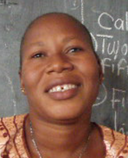
Ellen
Ellen is another natural-born teacher, teaching 2nd grade at St. Matthew's in Barra, the town on the north end of the ferry from the capital of Banjul across the mouth of the River Gambia. When I spoke with her, she was, like Evalinda, in the Kombo for classes at the Gambia College during the winter holiday, where she is now working toward her Primary Teachers' Certificate. There is a short recording of part of my conversation with Ellen at http://is.gd/EllenGibba
These and the other teachers studying at Gambia College with the support of GambiaRising are already naturally-gifted teachers. Over the next three years they will become even better, and at the end of that time, they will be able to earn enough to afford to stay in the teaching profession.
Thanks to you.
Ellen is another natural-born teacher, teaching 2nd grade at St. Matthew's in Barra, the town on the north end of the ferry from the capital of Banjul across the mouth of the River Gambia. When I spoke with her, she was, like Evalinda, in the Kombo for classes at the Gambia College during the winter holiday, where she is now working toward her Primary Teachers' Certificate. There is a short recording of part of my conversation with Ellen at http://is.gd/EllenGibba
These and the other teachers studying at Gambia College with the support of GambiaRising are already naturally-gifted teachers. Over the next three years they will become even better, and at the end of that time, they will be able to earn enough to afford to stay in the teaching profession.
Thanks to you.
Senior Secondary School - the big step
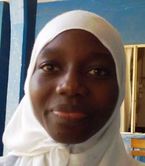
The World Bank has made it less expensive to go to elementary school (lower basic cycle school) in The Gambia this year. But as before, the biggest challenge, especially for girls, is making the leap to senior secondary school (grades 10 to 12). For upcountry students, this usually means leaving home, since no schools are within 10 to 15 miles of your home. For girls, if you are15 years or older, you are of marrying age. And if your family is poor, their first priority must be educating the boys, who by tradition, will be the ones you can rely on to support you in your old age.
And so, while lower costs allowed us to add more than 60 new elementary school students to our program this year, our focus continues to be keeping girls in school after 9th grade.
Today, 74% of the students we support are girls, and of those nearly half are in grade 10 or higher.
A Case in Point
Imagine being an off-the-charts intelligent young woman whose parents have died and who is living with relatives, realizing that 9th grade might be the last time you are in school. Please click here to listen to my conversation with Mariama, who is in 11th grade thanks to a GambiaRising scholarship. She is eloquent, and the conversation is 12 minutes long, so if you are short on time, forward ahead to 8:33. Luckily, Mariama knew a Peace Corps volunteer, who knew GambiaRising, and today she is the top student among the 12 students with GambiaRising scholarships attending Armitage Senior Secondary School.
That this is life-changing for the girl involved, there is no doubt. But there is broader societal impact as well. There is growing evidence that when girls are more educated, incomes rise, children are healthier, and population growth decreases.
In each conversation I had with students in The Gambia last month, they asked me to thank those whose generosity is allowing them to stay in school. I promised to do so.
Thank You.
And so, while lower costs allowed us to add more than 60 new elementary school students to our program this year, our focus continues to be keeping girls in school after 9th grade.
Today, 74% of the students we support are girls, and of those nearly half are in grade 10 or higher.
A Case in Point
Imagine being an off-the-charts intelligent young woman whose parents have died and who is living with relatives, realizing that 9th grade might be the last time you are in school. Please click here to listen to my conversation with Mariama, who is in 11th grade thanks to a GambiaRising scholarship. She is eloquent, and the conversation is 12 minutes long, so if you are short on time, forward ahead to 8:33. Luckily, Mariama knew a Peace Corps volunteer, who knew GambiaRising, and today she is the top student among the 12 students with GambiaRising scholarships attending Armitage Senior Secondary School.
That this is life-changing for the girl involved, there is no doubt. But there is broader societal impact as well. There is growing evidence that when girls are more educated, incomes rise, children are healthier, and population growth decreases.
In each conversation I had with students in The Gambia last month, they asked me to thank those whose generosity is allowing them to stay in school. I promised to do so.
Thank You.
Good News from The Gambia

January 24, 2014
I just returned from my annual visit to The Gambia, to meet with our wonderful team of Gambian educators and coordinators, and to meet as many students as I could.
Although is so much news to tell, I will keep these general updates short and then follow up to those sponsoring students with specific updates on the student(s) they are supporting as I have them.
The first news is that, in an effort to increase enrollment in Gambian schools, the World Bank has begun paying school fees for all Gambian students in grades 1 to 6. This does not ensure full enrollment, since books, required uniforms, and other necessities are not included But it does cut the cost of going to school at least in half.
Since the Gambian dalasi is also weaker against the dollar, this now means that everyone who is sponsoring a student in grades 1 through 6 is now donating enough to pay the full cost of two or three children, often with something left over to go into our college fund for the most promising older students. (As before, everyone working on our program does so without pay, and several donors are covering all the administrative costs of operating GambiaRising, so that 100% of all other donations go directly to paying for student support.)
In addition, when we got the news about the costs going down in September, we told Principal Kebba Sanyang at St Therese's in Fula Bantang that we would pay the costs of any student who could not afford the costs of going to school there, and would also contribute to the lunch fund for those students, with the goal of approaching 100% enrollment. And so the School Management Commiittee has been going compound to compound, asking parents to send their kids to school - with a full scholarship.
As a result, we are supporting 26 new children in grades K to 6 at St. Therese's alone, and a total of 78 old and new nationwide.
At St. Therese's, you can see the results. Students who did not start school when they turned five or six, are now in school. And so there are a number of 9- and 10-year olds in the school's first grade. Here are two of them, interviewed by Kebba Sanyang (click on their name to see the short video):
Fatoumata Fatty
Jainaba Gissey
Another wonderful story came when we heard from a student now in the last year of his advanced accounting studies through GambiaRising, who contacted us to say there were three young children in his neighborhood who were not in school; since he was not yet working (and his parents were deceased), could we pay the costs of books and cloth, if his brother, an apprentice tailor, made their uniforms. How could we say no?
I wish you could have been there to meet some of the children who are in school because of the generosity of the GambiaRising's donors. I am especially grateful to the 61 donors who are donating enough to fully sponsor one or more students (it costs as little as $12.50 per month). We have 17 new sponsors this year, and all but 2 of last year's sponsors have already renewed their support; so we're still hoping for 100%. This kind of commitment allows us to allocate funds as they come in, and help as many kids as we can, right away.
The Patcharr Miracle
And then there is Pachaar Lower Basic School, sitting proudly near the South Bank Road several miles east of Fula Bantang, with nearly 150 kids in grades K-3 in their brand new community-built school (GambiaRising paid for the roofing materials). Founded three years ago by St. Therese's Principal Kebba Sanyang and several community leaders, this is a new feeder school to St. Therese's for kids too young to walk the several miles to Fula Bantang until they are older. While in the area, we dropped by the compound of two students who have been supported by GambiaRising at St Therese's for more than three years, but who, we knew, had younger siblings at home who had not been in school. Sure enough, there were a number of smaller children in the compound. "Are these children in school?" I asked. "Yes," the answer came; "at Patcharr." That's a different answer than they would have given two years ago, and it would be true in family afer family.
When we got back to St. Therese's there was a three-page letter waiting for Kebba, from the Alkalo (chief) of Sinchu Dumbulla vliiage. It was simple and elegant; "Here are the names of children of Sinchu Dumbulla who should go to school." And then the names of nearly 100 children.
And so the work, with your support, is not quite finished.
I'll have an update on our students in higher grades in a later note. Thanks for the incredible difference you are making in these kids lives.
I just returned from my annual visit to The Gambia, to meet with our wonderful team of Gambian educators and coordinators, and to meet as many students as I could.
Although is so much news to tell, I will keep these general updates short and then follow up to those sponsoring students with specific updates on the student(s) they are supporting as I have them.
The first news is that, in an effort to increase enrollment in Gambian schools, the World Bank has begun paying school fees for all Gambian students in grades 1 to 6. This does not ensure full enrollment, since books, required uniforms, and other necessities are not included But it does cut the cost of going to school at least in half.
Since the Gambian dalasi is also weaker against the dollar, this now means that everyone who is sponsoring a student in grades 1 through 6 is now donating enough to pay the full cost of two or three children, often with something left over to go into our college fund for the most promising older students. (As before, everyone working on our program does so without pay, and several donors are covering all the administrative costs of operating GambiaRising, so that 100% of all other donations go directly to paying for student support.)
In addition, when we got the news about the costs going down in September, we told Principal Kebba Sanyang at St Therese's in Fula Bantang that we would pay the costs of any student who could not afford the costs of going to school there, and would also contribute to the lunch fund for those students, with the goal of approaching 100% enrollment. And so the School Management Commiittee has been going compound to compound, asking parents to send their kids to school - with a full scholarship.
As a result, we are supporting 26 new children in grades K to 6 at St. Therese's alone, and a total of 78 old and new nationwide.
At St. Therese's, you can see the results. Students who did not start school when they turned five or six, are now in school. And so there are a number of 9- and 10-year olds in the school's first grade. Here are two of them, interviewed by Kebba Sanyang (click on their name to see the short video):
Fatoumata Fatty
Jainaba Gissey
Another wonderful story came when we heard from a student now in the last year of his advanced accounting studies through GambiaRising, who contacted us to say there were three young children in his neighborhood who were not in school; since he was not yet working (and his parents were deceased), could we pay the costs of books and cloth, if his brother, an apprentice tailor, made their uniforms. How could we say no?
I wish you could have been there to meet some of the children who are in school because of the generosity of the GambiaRising's donors. I am especially grateful to the 61 donors who are donating enough to fully sponsor one or more students (it costs as little as $12.50 per month). We have 17 new sponsors this year, and all but 2 of last year's sponsors have already renewed their support; so we're still hoping for 100%. This kind of commitment allows us to allocate funds as they come in, and help as many kids as we can, right away.
The Patcharr Miracle
And then there is Pachaar Lower Basic School, sitting proudly near the South Bank Road several miles east of Fula Bantang, with nearly 150 kids in grades K-3 in their brand new community-built school (GambiaRising paid for the roofing materials). Founded three years ago by St. Therese's Principal Kebba Sanyang and several community leaders, this is a new feeder school to St. Therese's for kids too young to walk the several miles to Fula Bantang until they are older. While in the area, we dropped by the compound of two students who have been supported by GambiaRising at St Therese's for more than three years, but who, we knew, had younger siblings at home who had not been in school. Sure enough, there were a number of smaller children in the compound. "Are these children in school?" I asked. "Yes," the answer came; "at Patcharr." That's a different answer than they would have given two years ago, and it would be true in family afer family.
When we got back to St. Therese's there was a three-page letter waiting for Kebba, from the Alkalo (chief) of Sinchu Dumbulla vliiage. It was simple and elegant; "Here are the names of children of Sinchu Dumbulla who should go to school." And then the names of nearly 100 children.
And so the work, with your support, is not quite finished.
I'll have an update on our students in higher grades in a later note. Thanks for the incredible difference you are making in these kids lives.
A Quick Update on the New School Year
November 17, 2013
It is seven weeks into the new school year in The Gambia and across the country, and especially in the villages around Fula Bantang, children and students whose families couldn't afford to send them to school, have hope today .
Thanks to the the renewal of nearly all of last year's sponsors, the generosity of 19 new donors, some World Bank subsidies to school costs at the lower grades, and the care in budgeting by our team of Gambian educators, we were able to give full or partial scholarships to 204 Gambian students this year, from nursery school through college.
Of these, 141 are girls, and most if not all would not be in school without this assistance.
The number of donors committed to sponsoring one or more students rose to 61, and for the first time a majority of these were returned Peace Corps volunteers, their friends, and extended families.
This year's students are attending 46 different schools, although more than 50 are enrolled at St. Therese's in Fula Bantang, where we have done so much work, and where the school population continues to grow through our support. There are another 40 graduates of St. Therese's attending the three senior secondary schools in the region and in the capital. And another 4 graduates of St. Therese's are now at GTTI, Gambia College, or the University of The Gambia, along with one promising teacher from St. Therese's now in his second year at Gambia [Teacher's] College.
One student we support at the University of The Gambia was even invited to spend the fall semester studying at St. Mary's College in Maryland thus freeing up funds to support another five students in high school.
Meanwhile, the Gambian dalasi continues to weaken, and the economy is in a deep rut, but these 204 students still have hope for a better future.
Two of our partners are just returning from a visit to Fula Bantang, and I will be going back in January as well, so we'll be sending photos and stories in coming months.
This is all such great news for the children and students who received support, and it would have been completely impossible if not for the dedication of Father Moses Drammeh, Kebba Sanyang, Dawda Faye, Lamin Cham, Matthew Gomez, Rafael Jawo, and the other Gambian educators who volunteer their time to coordinate the program. And of course for the support of Dr. Emil Kujabi, the Catholic Education Secretary who oversees the best network of public schools in the country. So much smart, hard work goes into coordinating this program, and I know is not easy to meet with families, decide which students are most in need and most promising, make sure the fees are paid, keep meticulous records, etc. etc. But it is getting done.
And of course, none of this would happen without the generosity of our donors. We are such a small organization, and every one is absolutely necessary. We treat our small budget as precious, and my wife and I cover all the overhead, so every other donated dollar goes directly to support the students.
We decided to take a risk this year, and used our fall donations and pledges to support as many deserving and promising students who could not start school without our help as our funds allowed. That means that over the next few months, as we receive new appeals from students who started school but whose parents can't pay for the second or third term, we won't have a reserve to respond to them. So we are counting on finding a few more generous souls who can sign up to donate as little as $12.50 per month to make sure another Gambian student gets to stay in school when their funds run out. It takes literally less than two minutes: www.gambiarising.org/donate
If you can help, or if you know someone who can, it will make all the difference; it will literally change one girl or boy's life.
Thank you so much.
It is seven weeks into the new school year in The Gambia and across the country, and especially in the villages around Fula Bantang, children and students whose families couldn't afford to send them to school, have hope today .
Thanks to the the renewal of nearly all of last year's sponsors, the generosity of 19 new donors, some World Bank subsidies to school costs at the lower grades, and the care in budgeting by our team of Gambian educators, we were able to give full or partial scholarships to 204 Gambian students this year, from nursery school through college.
Of these, 141 are girls, and most if not all would not be in school without this assistance.
The number of donors committed to sponsoring one or more students rose to 61, and for the first time a majority of these were returned Peace Corps volunteers, their friends, and extended families.
This year's students are attending 46 different schools, although more than 50 are enrolled at St. Therese's in Fula Bantang, where we have done so much work, and where the school population continues to grow through our support. There are another 40 graduates of St. Therese's attending the three senior secondary schools in the region and in the capital. And another 4 graduates of St. Therese's are now at GTTI, Gambia College, or the University of The Gambia, along with one promising teacher from St. Therese's now in his second year at Gambia [Teacher's] College.
One student we support at the University of The Gambia was even invited to spend the fall semester studying at St. Mary's College in Maryland thus freeing up funds to support another five students in high school.
Meanwhile, the Gambian dalasi continues to weaken, and the economy is in a deep rut, but these 204 students still have hope for a better future.
Two of our partners are just returning from a visit to Fula Bantang, and I will be going back in January as well, so we'll be sending photos and stories in coming months.
This is all such great news for the children and students who received support, and it would have been completely impossible if not for the dedication of Father Moses Drammeh, Kebba Sanyang, Dawda Faye, Lamin Cham, Matthew Gomez, Rafael Jawo, and the other Gambian educators who volunteer their time to coordinate the program. And of course for the support of Dr. Emil Kujabi, the Catholic Education Secretary who oversees the best network of public schools in the country. So much smart, hard work goes into coordinating this program, and I know is not easy to meet with families, decide which students are most in need and most promising, make sure the fees are paid, keep meticulous records, etc. etc. But it is getting done.
And of course, none of this would happen without the generosity of our donors. We are such a small organization, and every one is absolutely necessary. We treat our small budget as precious, and my wife and I cover all the overhead, so every other donated dollar goes directly to support the students.
We decided to take a risk this year, and used our fall donations and pledges to support as many deserving and promising students who could not start school without our help as our funds allowed. That means that over the next few months, as we receive new appeals from students who started school but whose parents can't pay for the second or third term, we won't have a reserve to respond to them. So we are counting on finding a few more generous souls who can sign up to donate as little as $12.50 per month to make sure another Gambian student gets to stay in school when their funds run out. It takes literally less than two minutes: www.gambiarising.org/donate
If you can help, or if you know someone who can, it will make all the difference; it will literally change one girl or boy's life.
Thank you so much.
GambiaRising's new expanded organization
August 25, 2013
GambiaRising began with a few friends of Mike McConnell who sent checks to support several students whose cases came to his attention while he was Country Director for Peace Corps in The Gambia. When he returned to the U.S. at the end of 2009, more friends offered to do the same and they formally sought IRS cognition as a tax-exempt California trust. Today our Board of Trustees includes five returned Peace Corps volunteers and others who served in The Gambia are helping the program in various ways.
On the ground, much of the early program development was in partnership with Father Jean Diagne who was parish priest in Bansang and Vice Principal at St. Therese’s Basic Cycle (K-9) School in upcountry Fula Bantang, a full day’s drive up country from the capital. When Father Jean was re-posted to Senegal, Kebba Sanyang, the Principal of St. Therese’s, began playing a larger role. For students in the area around the capital (the districts known as the Kombos), the staff at the Catholic Education Secretariat offices headed by Dr. Emil Kujabi, with Education Secretary Dawda Faye became central. (The Secretariat, under contract with the government administers a network of public schools originally built by the church.) And in the Northern River Region (across the River Gambia), the former Principal of St. Therese’s, Matthew Gomez, began coordinating with the students we were supporting at St. Michael’s school there.
At Peace Corps, Lamin Cham continues to provide invaluable support with banking, technology, and coordinating contact with our early students. And Ebrima Bah and other staff at Peace Corps help us as their schedules allow.
This fall, Father Jean will be re-locating again; this time to Cameroon for several years of further studies for his work in the seminary in Dakar. Father Moses Drammeh, a Gambian who I have been working with since January, will take over as National Coordinator. Father Moses lives in Lamin (in the Kombos) and is Rector of the seminary at St. Peter’s there. And Kebba Sanyang will take on more responsibility for the students in upcountry schools along the South Bank.
All of the people working on the program are working without pay, and are pleased to be able to assist the deserving students who your donations are keeping in school. You can read more about our team at http://www.gambiarising.org/about-us.html
GambiaRising began with a few friends of Mike McConnell who sent checks to support several students whose cases came to his attention while he was Country Director for Peace Corps in The Gambia. When he returned to the U.S. at the end of 2009, more friends offered to do the same and they formally sought IRS cognition as a tax-exempt California trust. Today our Board of Trustees includes five returned Peace Corps volunteers and others who served in The Gambia are helping the program in various ways.
On the ground, much of the early program development was in partnership with Father Jean Diagne who was parish priest in Bansang and Vice Principal at St. Therese’s Basic Cycle (K-9) School in upcountry Fula Bantang, a full day’s drive up country from the capital. When Father Jean was re-posted to Senegal, Kebba Sanyang, the Principal of St. Therese’s, began playing a larger role. For students in the area around the capital (the districts known as the Kombos), the staff at the Catholic Education Secretariat offices headed by Dr. Emil Kujabi, with Education Secretary Dawda Faye became central. (The Secretariat, under contract with the government administers a network of public schools originally built by the church.) And in the Northern River Region (across the River Gambia), the former Principal of St. Therese’s, Matthew Gomez, began coordinating with the students we were supporting at St. Michael’s school there.
At Peace Corps, Lamin Cham continues to provide invaluable support with banking, technology, and coordinating contact with our early students. And Ebrima Bah and other staff at Peace Corps help us as their schedules allow.
This fall, Father Jean will be re-locating again; this time to Cameroon for several years of further studies for his work in the seminary in Dakar. Father Moses Drammeh, a Gambian who I have been working with since January, will take over as National Coordinator. Father Moses lives in Lamin (in the Kombos) and is Rector of the seminary at St. Peter’s there. And Kebba Sanyang will take on more responsibility for the students in upcountry schools along the South Bank.
All of the people working on the program are working without pay, and are pleased to be able to assist the deserving students who your donations are keeping in school. You can read more about our team at http://www.gambiarising.org/about-us.html
Would you go to school if you had a scholarship?
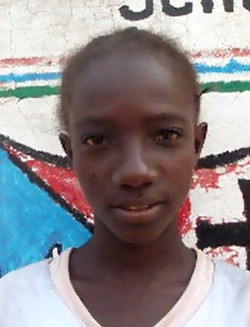
April 26, 2013
At St. Therese's, the School Management Committee of parents, community members, and staff are in charge of deciding which students will be nominated for support by GambiaRising.
In the past year, they have gone further. They have visited families where children were not in school because they could not afford the uniform and fees, and asked if the family would be willing to send their child to school if they received a scholarship.
And so Khadijatou Jawo, whose father had died and whose mother had difficulty just providing a meal or two each day, started school at age 14. Now in 2nd grade, she is shy and she had trouble understanding my English. But there are so many things to be glad about in the short video I made of her.
She is in school. The community sought her out. Another student (off-camera) is sweetly helping her with the interview. And of course, at school she receives not only an education, social interaction, and self-esteem, but a hot meal every school day. The very short interview with Khadijatou can be seen here http://is.gd/KhadijatouJawo2013 .
The only thing missing is a sponsor. We gave her an emergency grant from our general fund, but we really need to find a long-term supporter for her to continue. If you can help her or any of the dozen or so students we still need sponsors for, please do so on our Donate page. No amount is too small.
At St. Therese's, the School Management Committee of parents, community members, and staff are in charge of deciding which students will be nominated for support by GambiaRising.
In the past year, they have gone further. They have visited families where children were not in school because they could not afford the uniform and fees, and asked if the family would be willing to send their child to school if they received a scholarship.
And so Khadijatou Jawo, whose father had died and whose mother had difficulty just providing a meal or two each day, started school at age 14. Now in 2nd grade, she is shy and she had trouble understanding my English. But there are so many things to be glad about in the short video I made of her.
She is in school. The community sought her out. Another student (off-camera) is sweetly helping her with the interview. And of course, at school she receives not only an education, social interaction, and self-esteem, but a hot meal every school day. The very short interview with Khadijatou can be seen here http://is.gd/KhadijatouJawo2013 .
The only thing missing is a sponsor. We gave her an emergency grant from our general fund, but we really need to find a long-term supporter for her to continue. If you can help her or any of the dozen or so students we still need sponsors for, please do so on our Donate page. No amount is too small.
Staying in School
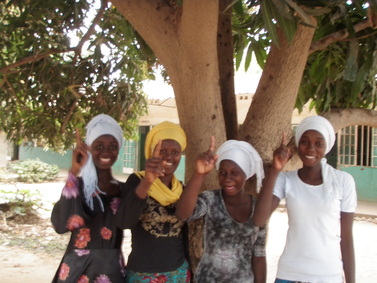
February 18, 2013
Much of GambiaRising's scholarship program is focused on giving girls a chance for an education. We believe all children deserve a chance to get an education, and 1/3 of the students we support are boys, but the fact is when a family is too poor to send all its kids to school, the girls get pulled out first.
This becomes most serious after 9th grade. In the area around St. Therese's in Fula Bantang, there is no high school close enough to most villages to reasonably walk to. And since that is also a time when a girl is old enough to be married off, thereby reducing the financial burden on the family and bringing in a small bride price to boot, the risk of leaving school at that time is the greatest.
There are three high schools ("senior secondary schools") within 20 miles of Fula Bantang. The best is Armitage, on McCarthy Island, and for the fortunate few with excellent exam scores, theres is a boarding program there as well. Armitage has two shifts, the second each day is for day students, and for these day students and those who attend the other two, Bansang or Brikamaba Senior Secondary Schools, we must either find housing for them and/or, provide a bike if a student lives in a village within 5 miles of Brikamaba.
This year, 48 students supported by GambiaRising are attending one of these three schools. 33 of them are girls.
All, or nearly all, of them would not be in school today without the support they received from our donors. Many of the girls would also have been married off. How do we know? Many of them first appealed for our help when their parents announced it was time for them to stop school and marry.
But I also want to talk about the intangible effects on the school and the community of this change in the course of so many young lives. I have already written about the village turning out to build bricks, fence in, then plant and harvest the new cashew orchard/rice field next to the school. The community is really supporting its school.
But the effect on the students is also noticeable. What most struck me in meeting the new 10th grade students this year was their confidence, and the changed expectations they have for what their life can be.
While this is going to be a fundraising challenge in a few years, as they graduate and raise their sights even higher, for today it is just heartwarming. Even the Peace Corps volunteer at Armitage remarked on it: "this new crop of St. Therese's grads has spirit."
I could tell this has something to do with the school they came from when they told us that there was a big inter-school athletic contest coming up and they would like to have St. Therese's t-shirts to wear to it. Not Armitage T-shirts; St. Therese's t-shirts.
I have uploaded about half of the videos I took a few weeks ago to our YouTube GambiaScholars channel. They are pretty formal, although I try to keep the conversations casual and even joke a little when I can.
But among all of them, I find that one of my favorite videos is not of any specific student; it is of 8 of the St. Therese's girls (and inevitably, one boy) walking along the street outside Armitage with Father Jean and Principal Kebba Sanyang. The Armitage Boarding School has strict rules about girls leaving the campus, so the banter that is going on is about the girls using Father Jean and Kebba as an excuse to leave the campus.
As you can see, these are not shy, retiring young women. They are going to go someplace; if not today, then someday. And they know it.
Thanks to their own hard work, and the chance that GambiaRising's donors are giving them. Take a minute and watch them here.
Thanks so much for your support. If are not yet and would like to support a student, please you can do so here; it takes as little as $12.50 per month. Also, please forward this note to anyone you think may be interested. And again, on behalf of these wonderful students, many many thanks.
Much of GambiaRising's scholarship program is focused on giving girls a chance for an education. We believe all children deserve a chance to get an education, and 1/3 of the students we support are boys, but the fact is when a family is too poor to send all its kids to school, the girls get pulled out first.
This becomes most serious after 9th grade. In the area around St. Therese's in Fula Bantang, there is no high school close enough to most villages to reasonably walk to. And since that is also a time when a girl is old enough to be married off, thereby reducing the financial burden on the family and bringing in a small bride price to boot, the risk of leaving school at that time is the greatest.
There are three high schools ("senior secondary schools") within 20 miles of Fula Bantang. The best is Armitage, on McCarthy Island, and for the fortunate few with excellent exam scores, theres is a boarding program there as well. Armitage has two shifts, the second each day is for day students, and for these day students and those who attend the other two, Bansang or Brikamaba Senior Secondary Schools, we must either find housing for them and/or, provide a bike if a student lives in a village within 5 miles of Brikamaba.
This year, 48 students supported by GambiaRising are attending one of these three schools. 33 of them are girls.
All, or nearly all, of them would not be in school today without the support they received from our donors. Many of the girls would also have been married off. How do we know? Many of them first appealed for our help when their parents announced it was time for them to stop school and marry.
But I also want to talk about the intangible effects on the school and the community of this change in the course of so many young lives. I have already written about the village turning out to build bricks, fence in, then plant and harvest the new cashew orchard/rice field next to the school. The community is really supporting its school.
But the effect on the students is also noticeable. What most struck me in meeting the new 10th grade students this year was their confidence, and the changed expectations they have for what their life can be.
While this is going to be a fundraising challenge in a few years, as they graduate and raise their sights even higher, for today it is just heartwarming. Even the Peace Corps volunteer at Armitage remarked on it: "this new crop of St. Therese's grads has spirit."
I could tell this has something to do with the school they came from when they told us that there was a big inter-school athletic contest coming up and they would like to have St. Therese's t-shirts to wear to it. Not Armitage T-shirts; St. Therese's t-shirts.
I have uploaded about half of the videos I took a few weeks ago to our YouTube GambiaScholars channel. They are pretty formal, although I try to keep the conversations casual and even joke a little when I can.
But among all of them, I find that one of my favorite videos is not of any specific student; it is of 8 of the St. Therese's girls (and inevitably, one boy) walking along the street outside Armitage with Father Jean and Principal Kebba Sanyang. The Armitage Boarding School has strict rules about girls leaving the campus, so the banter that is going on is about the girls using Father Jean and Kebba as an excuse to leave the campus.
As you can see, these are not shy, retiring young women. They are going to go someplace; if not today, then someday. And they know it.
Thanks to their own hard work, and the chance that GambiaRising's donors are giving them. Take a minute and watch them here.
Thanks so much for your support. If are not yet and would like to support a student, please you can do so here; it takes as little as $12.50 per month. Also, please forward this note to anyone you think may be interested. And again, on behalf of these wonderful students, many many thanks.
Back from The Gambia
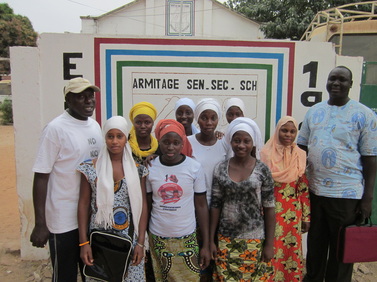
February 4, 2013
I just returned from a productive and inspiring two weeks in The Gambia. We took a number of big steps in developing an on-the-ground organization of Gambian volunteers, to supplement Father Jean's and my oversight. I was also able to meet and video short interviews with 74 of the students that are being supported through the generosity of GambiaRising donors.
I am going to try to keep my updates shorter this year, so I will not try to make a full report today. But I do want to introduce you to a few remarkable young students.
On my second day in country, I met with Maimouna Baldeh. Three years ago, Maimouna was an "unqualified" (non-degreed) teacher at St. Therese's in Fula Bantang. The school had no electricity, and she had never used a computer. With the support of a GambiaRising donor, Maimouna enrolled in a college prep program, then studied one term at the Management Development Institute in Kanfing. She has now transferred to the University of The Gambia, where I met with her after she had completed her first day of classes. You can see our conversation at http://www.youtube.com/watch?v=ZZm8DuOCLQE
We then headed up country, to Fula Bantang and the towns around it where students are attending senior secondary school. St. Therese's graduated 46 twelfth graders last year; 45 of them went on to senior secondary school this year; an extraordinary statistic for The Gambia. Eleven of those were students supported by GambiaRising donors. 100% of them are in 10th grade this year. One of them is Mariama Touray, who is boarding at Armitage school in Janjanbureh. This new crop of 10th graders really impressed Joanna LaHaie, the Peace Corps volunteer stationed at Armitage; "They're so confident this year," she noted. I suspect it may have something to do with being part of a cohort of peers from their school; the students are giving each other confidence. Here is a short interview with Mariama: http://youtu.be/6v8Tsm3FLYs
Back at St. Therese's, I met a new student to our program, Bubacarr Jallow. Most students are understandably formal and reserved in front of the camera. So I was surprised and delighted when after introducing himself as I had asked him to do, he then said, "And you?"
Bubacarr was in 8th grade, but seemed mature for that grade. "How old are you?" I asked. "17, he replied." I recalled that I had been in 12th grade when I was 17 so I later asked Principal Kebba Sanyang what Bubacarr's story was. "His family is very poor and his father knew that he could not afford to send him to school, so he did not. He sat at home. But as the boy grew, he started insisting that he go to school.
"Finally when he was 9, he convinced his father to register him. He managed to get him through 6th grade, but at the end of 7th grade, his father was not able to pay his fees, so he was about to be sent out. We allowed him to complete the year hoping that that he will be accepted into GambiaRising's program."
As you can hear in this short interview, Bubacarr is a clear-headed young man with a plan, who with a little help from a GambiaRising's donor, is going to change the course of his family's history. http://youtu.be/mAUqOvu9pzw
The generosity of GambiaRising's donors is allowing us to support 160 students like these all over The Gambia. Father Jean has another five he hopes we can help soon.
Thank you so much for your generosity and support; as always, please forward this note to anyone you think might be interested in supporting a student.
I just returned from a productive and inspiring two weeks in The Gambia. We took a number of big steps in developing an on-the-ground organization of Gambian volunteers, to supplement Father Jean's and my oversight. I was also able to meet and video short interviews with 74 of the students that are being supported through the generosity of GambiaRising donors.
I am going to try to keep my updates shorter this year, so I will not try to make a full report today. But I do want to introduce you to a few remarkable young students.
On my second day in country, I met with Maimouna Baldeh. Three years ago, Maimouna was an "unqualified" (non-degreed) teacher at St. Therese's in Fula Bantang. The school had no electricity, and she had never used a computer. With the support of a GambiaRising donor, Maimouna enrolled in a college prep program, then studied one term at the Management Development Institute in Kanfing. She has now transferred to the University of The Gambia, where I met with her after she had completed her first day of classes. You can see our conversation at http://www.youtube.com/watch?v=ZZm8DuOCLQE
We then headed up country, to Fula Bantang and the towns around it where students are attending senior secondary school. St. Therese's graduated 46 twelfth graders last year; 45 of them went on to senior secondary school this year; an extraordinary statistic for The Gambia. Eleven of those were students supported by GambiaRising donors. 100% of them are in 10th grade this year. One of them is Mariama Touray, who is boarding at Armitage school in Janjanbureh. This new crop of 10th graders really impressed Joanna LaHaie, the Peace Corps volunteer stationed at Armitage; "They're so confident this year," she noted. I suspect it may have something to do with being part of a cohort of peers from their school; the students are giving each other confidence. Here is a short interview with Mariama: http://youtu.be/6v8Tsm3FLYs
Back at St. Therese's, I met a new student to our program, Bubacarr Jallow. Most students are understandably formal and reserved in front of the camera. So I was surprised and delighted when after introducing himself as I had asked him to do, he then said, "And you?"
Bubacarr was in 8th grade, but seemed mature for that grade. "How old are you?" I asked. "17, he replied." I recalled that I had been in 12th grade when I was 17 so I later asked Principal Kebba Sanyang what Bubacarr's story was. "His family is very poor and his father knew that he could not afford to send him to school, so he did not. He sat at home. But as the boy grew, he started insisting that he go to school.
"Finally when he was 9, he convinced his father to register him. He managed to get him through 6th grade, but at the end of 7th grade, his father was not able to pay his fees, so he was about to be sent out. We allowed him to complete the year hoping that that he will be accepted into GambiaRising's program."
As you can hear in this short interview, Bubacarr is a clear-headed young man with a plan, who with a little help from a GambiaRising's donor, is going to change the course of his family's history. http://youtu.be/mAUqOvu9pzw
The generosity of GambiaRising's donors is allowing us to support 160 students like these all over The Gambia. Father Jean has another five he hopes we can help soon.
Thank you so much for your generosity and support; as always, please forward this note to anyone you think might be interested in supporting a student.
Father Jean's Visit, and a Report to the Board
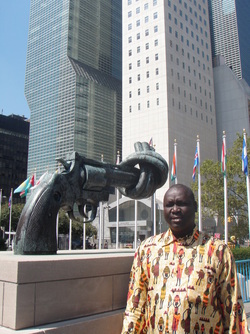
3 September 2012
I hope Father Jean wasn’t looking forward to a restful vacation on his first trip to the United States. Because when I sent an email asking if any of our supporters wanted to meet him while h
e was here, enough said yes that we ate nearly every meal in a different location, and did a lot of driving in between. But my friends live in beautiful places, so we did see some sights en route.
Luckily, Father Jean got some rest by spending his first four nights with the Gambian High Commissioner to the United Nations, at her home in the suburbs of New York City. This was his first experience with jet lag and it surprised him.
I met them on Day Four at her offices a few blocks from the U.N. During our conversation, I had to smile as Father Jean addressed the woman I thought of as Madame High Commissioner as “Mama Suzanne,” his old parishioner from Bakau.
When I found out Father Jean had not yet spent much time in Manhattan, I asked what he wanted to do with the half-day we had left in New York. “See the United Nations,” he replied. So we took the tour. I remembered taking much the same tour when I was nine years old, and the sense of hope for a better world that seemed so fresh back then. I was glad that Father Jean still had it, and truth be told, the tour still moved me.
And how could I not be moved as Father Jean photographed Article 26 of the Universal Declaration of Human Rights:
"Everyone has the right to education. Education shall be free, at least in the elementary and fundamental stages. Elementary education shall be compulsory. Technical and professional education shall be made generally available and higher education shall be equally accessible to all on the basis of merit."
Lofty goals, but as so much else in the Declaration, still tragically far from being a reality.
After a relaxing two days with friends in the Berkshires, and two more at a friend’s home overlooking the Charles River in South Natick (and with a detour in between to visit our former Gambian coordinator, Yaya Sonko, who is about to start college just outside of Providence), we headed for California.
Thanks to a generous supporter, Father Jean had a place to stay in our loft building in Emeryville, where he could log on to our wi-fi and where we held our first face-to-face GambiaRising Board meeting.
Driving around the Bay area to meet some of our donors, we had plenty of time to talk. He is a committed, remarkable man, and the depth of his commitment to helping others was revealed anew every time we met with someone.
And some of the questions in our meetings also brought new and fascinating information to light. Such as how Father Jean came to become a Catholic (his family is Muslim): “I told the French priest in our town that I wanted to be like him.”
Or the fact that after his junior year in high school, his father insisted he stop wrestling (wrestling rivals football/soccer in west Africa as a spectator sport); at the time he was undefeated and becoming a minor celebrity in southern Senegal.
Or perhaps more interestingly, that when I met him in 2008, he had been acting as Assistant Principal at St. Therese’s in Fula Bantang, in addition to his duties as parish priest. And whenever a family could not pay a students’ fees, he had investigated to determine the reason. If he determined that they truly were struggling even to eat, he had been telling the school “Put that child on my account,” which allowed them to stay in school. So when Father Jean and I had first met to talk about one student that a friend and mentor of mine had agreed to sponsor, and when he had gently urged me to think about the” other children” in the school as well, what was unknown to me at the time was that he had more than a dozen children whose fees he had no way of paying, but who were “on his account.” And thus GambiaRising was born.
For our Board meeting, I prepared a report on GambiaRising's scholarship program. At the end of the 2011-2 school year, we were supporting 114 students.
Of those, 43 were in grades K- 9,
55 were in senior secondary school,
11 at post high-school vocational schools, and
5 were in college or college prep.
We had started the year with 84 students; one had dropped out when she got pregnant (she hopes to return after a year or two), and 31 new students were added during the school year (THANKS to those donors who came aboard during the year and made that possible.)
Five of the girls in the 3-year secretarial/office training program at Presentation School in Banjul graduated in June. I have uploaded their graduation photos here:http://www.flickr.com/photos/32992564@N03/
Two students in the three-year ACCA (accounting) program received their certificates (ACCA is the British equivalent of a Certified Public Accountant); one already has a job. Six more students graduated from Senior Secondary School and we are waiting for exam results to see how many are candidates for further study.
On the other hand, we already have appeals to support 17 new students, and that is before the School Management Committee at St. Therese’s makes their requests for new support. And of course if some of our graduates from 12th grade qualify for college, the cost of their education will quadruple.
Working with the Catholic Education Secretariat has been a real blessing; they are completely dedicated to educating children of all tribes and religions. Under their agreement with the Gambian government, they are administering 14 schools around the country; the curriculum is the same as the other public schools (including Islamic Studies and Christian Religious Studies). The teachers are assigned from the same teacher pool as other schools, but the administration is far better. (Under a similar agreement, I am told that the Methodists are administering Armitage Senior Secondary School, where most of our high school students attend.)
This means that by working with the Secretariat, we have the means to relatively easily support students at other schools under their jurisdiction. But it also means that Secretariat staff members are bringing to our attention especially compelling cases from around the country, and appealing for our support. While our primary focus will continue to be the students at St. Therese’s, if we have the capacity, we certainly would like to support equally needy cases elsewhere in the country.
GambiaRising started the 2010-11 school year supporting 60 students, and by the end of the school year we were supporting 85. We began the following year at 84, and ended in June with 114. We decided that our goal this year will be to support a minimum of 150 students which, after subtracting our recent graduates, is a net of 43 new students. Almost certainly we will have more than 43 worthy new appeals, which tend to build as the year goes on and families run out of money.
To keep pace, we will have to expand our donor/sponsor base.
GambiaRising began as an informal group of my personal friends who sent donations for students in need while I was Country Director for Peace Corps The Gambia. By the time I left at the end of 2009, my friends and I were supporting 23 students. When we formally organized GambiaRising in 2010, it was still largely an ever-expanding circle of my friends (and relatives). But as generous as my friends are, that can only take us so far. Some of the most encouraging moments during Father Jean’s visit were lunches and dinners in which he met friends of friends, several of whom are now supporting students. And our last dinner, high on a hill overlooking Marin County, was at the home of a friend of an old friend, who had just started sponsoring two girls and whom I had not yet met. And she in turn had invited two of her friends to meet with us. This is the kind of spreading the word that will allow our circle to expand at a pace that keeps up with the appeals that are due to start coming in.
In another encouraging development, seven returned Peace Corps volunteers from The Gambia are now supporting students, and more than thirty pitched in at Christmas time to help the goddaughterof a Gambian staff member who was about to be sent home from the U.S. when she fell short of the funds while at junior college in Minnesota. Two new returned volunteers have joined our Board of Trustees as well.
And so, instead of bracing myself for the disappointment and sense of sadness that I was steeling myself for as we enter the new school year, I find myself hopeful. Hopeful that, with the help of not only friends, but their friends, we will be able to reach enough new supporters to be able to take care of the most worthy of the appeals that I know are about to come. In the next two weeks, I will send out our fall appeal. If you are already sponsoring one or more students, thanks in advance; what you can do in addition is simply forward that email to some of your friends. Let them know why you are supporting the program, and these kids. Our new monthly donation program makes it so painless to give: as little as $12.50 per month for a child in grades K-6.
It takes so little to change a life.
Thanks to everyone for helping to get us this far, and for helping to expand the circle so we can support more deserving kids this coming year.
I hope Father Jean wasn’t looking forward to a restful vacation on his first trip to the United States. Because when I sent an email asking if any of our supporters wanted to meet him while h
e was here, enough said yes that we ate nearly every meal in a different location, and did a lot of driving in between. But my friends live in beautiful places, so we did see some sights en route.
Luckily, Father Jean got some rest by spending his first four nights with the Gambian High Commissioner to the United Nations, at her home in the suburbs of New York City. This was his first experience with jet lag and it surprised him.
I met them on Day Four at her offices a few blocks from the U.N. During our conversation, I had to smile as Father Jean addressed the woman I thought of as Madame High Commissioner as “Mama Suzanne,” his old parishioner from Bakau.
When I found out Father Jean had not yet spent much time in Manhattan, I asked what he wanted to do with the half-day we had left in New York. “See the United Nations,” he replied. So we took the tour. I remembered taking much the same tour when I was nine years old, and the sense of hope for a better world that seemed so fresh back then. I was glad that Father Jean still had it, and truth be told, the tour still moved me.
And how could I not be moved as Father Jean photographed Article 26 of the Universal Declaration of Human Rights:
"Everyone has the right to education. Education shall be free, at least in the elementary and fundamental stages. Elementary education shall be compulsory. Technical and professional education shall be made generally available and higher education shall be equally accessible to all on the basis of merit."
Lofty goals, but as so much else in the Declaration, still tragically far from being a reality.
After a relaxing two days with friends in the Berkshires, and two more at a friend’s home overlooking the Charles River in South Natick (and with a detour in between to visit our former Gambian coordinator, Yaya Sonko, who is about to start college just outside of Providence), we headed for California.
Thanks to a generous supporter, Father Jean had a place to stay in our loft building in Emeryville, where he could log on to our wi-fi and where we held our first face-to-face GambiaRising Board meeting.
Driving around the Bay area to meet some of our donors, we had plenty of time to talk. He is a committed, remarkable man, and the depth of his commitment to helping others was revealed anew every time we met with someone.
And some of the questions in our meetings also brought new and fascinating information to light. Such as how Father Jean came to become a Catholic (his family is Muslim): “I told the French priest in our town that I wanted to be like him.”
Or the fact that after his junior year in high school, his father insisted he stop wrestling (wrestling rivals football/soccer in west Africa as a spectator sport); at the time he was undefeated and becoming a minor celebrity in southern Senegal.
Or perhaps more interestingly, that when I met him in 2008, he had been acting as Assistant Principal at St. Therese’s in Fula Bantang, in addition to his duties as parish priest. And whenever a family could not pay a students’ fees, he had investigated to determine the reason. If he determined that they truly were struggling even to eat, he had been telling the school “Put that child on my account,” which allowed them to stay in school. So when Father Jean and I had first met to talk about one student that a friend and mentor of mine had agreed to sponsor, and when he had gently urged me to think about the” other children” in the school as well, what was unknown to me at the time was that he had more than a dozen children whose fees he had no way of paying, but who were “on his account.” And thus GambiaRising was born.
For our Board meeting, I prepared a report on GambiaRising's scholarship program. At the end of the 2011-2 school year, we were supporting 114 students.
Of those, 43 were in grades K- 9,
55 were in senior secondary school,
11 at post high-school vocational schools, and
5 were in college or college prep.
We had started the year with 84 students; one had dropped out when she got pregnant (she hopes to return after a year or two), and 31 new students were added during the school year (THANKS to those donors who came aboard during the year and made that possible.)
Five of the girls in the 3-year secretarial/office training program at Presentation School in Banjul graduated in June. I have uploaded their graduation photos here:http://www.flickr.com/photos/32992564@N03/
Two students in the three-year ACCA (accounting) program received their certificates (ACCA is the British equivalent of a Certified Public Accountant); one already has a job. Six more students graduated from Senior Secondary School and we are waiting for exam results to see how many are candidates for further study.
On the other hand, we already have appeals to support 17 new students, and that is before the School Management Committee at St. Therese’s makes their requests for new support. And of course if some of our graduates from 12th grade qualify for college, the cost of their education will quadruple.
Working with the Catholic Education Secretariat has been a real blessing; they are completely dedicated to educating children of all tribes and religions. Under their agreement with the Gambian government, they are administering 14 schools around the country; the curriculum is the same as the other public schools (including Islamic Studies and Christian Religious Studies). The teachers are assigned from the same teacher pool as other schools, but the administration is far better. (Under a similar agreement, I am told that the Methodists are administering Armitage Senior Secondary School, where most of our high school students attend.)
This means that by working with the Secretariat, we have the means to relatively easily support students at other schools under their jurisdiction. But it also means that Secretariat staff members are bringing to our attention especially compelling cases from around the country, and appealing for our support. While our primary focus will continue to be the students at St. Therese’s, if we have the capacity, we certainly would like to support equally needy cases elsewhere in the country.
GambiaRising started the 2010-11 school year supporting 60 students, and by the end of the school year we were supporting 85. We began the following year at 84, and ended in June with 114. We decided that our goal this year will be to support a minimum of 150 students which, after subtracting our recent graduates, is a net of 43 new students. Almost certainly we will have more than 43 worthy new appeals, which tend to build as the year goes on and families run out of money.
To keep pace, we will have to expand our donor/sponsor base.
GambiaRising began as an informal group of my personal friends who sent donations for students in need while I was Country Director for Peace Corps The Gambia. By the time I left at the end of 2009, my friends and I were supporting 23 students. When we formally organized GambiaRising in 2010, it was still largely an ever-expanding circle of my friends (and relatives). But as generous as my friends are, that can only take us so far. Some of the most encouraging moments during Father Jean’s visit were lunches and dinners in which he met friends of friends, several of whom are now supporting students. And our last dinner, high on a hill overlooking Marin County, was at the home of a friend of an old friend, who had just started sponsoring two girls and whom I had not yet met. And she in turn had invited two of her friends to meet with us. This is the kind of spreading the word that will allow our circle to expand at a pace that keeps up with the appeals that are due to start coming in.
In another encouraging development, seven returned Peace Corps volunteers from The Gambia are now supporting students, and more than thirty pitched in at Christmas time to help the goddaughterof a Gambian staff member who was about to be sent home from the U.S. when she fell short of the funds while at junior college in Minnesota. Two new returned volunteers have joined our Board of Trustees as well.
And so, instead of bracing myself for the disappointment and sense of sadness that I was steeling myself for as we enter the new school year, I find myself hopeful. Hopeful that, with the help of not only friends, but their friends, we will be able to reach enough new supporters to be able to take care of the most worthy of the appeals that I know are about to come. In the next two weeks, I will send out our fall appeal. If you are already sponsoring one or more students, thanks in advance; what you can do in addition is simply forward that email to some of your friends. Let them know why you are supporting the program, and these kids. Our new monthly donation program makes it so painless to give: as little as $12.50 per month for a child in grades K-6.
It takes so little to change a life.
Thanks to everyone for helping to get us this far, and for helping to expand the circle so we can support more deserving kids this coming year.
A Community Builds a Wall, and a Future for its School
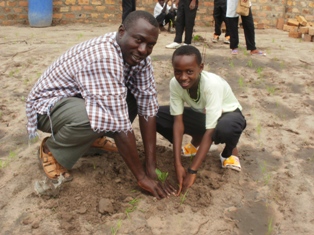
August 6, 2012
When I visited St. Therese's Basic Cycle School in Fula Bantang in January, I made short videos of thirty or so of the students, to share with their sponsors and to upload to our GambiaScholars YouTube channel (http://www.youtube.com/user/GambiaScholars). Several of these videos were interrupted by the bleating of goats, who wandered freely in and out of classrooms while we worked.
St. Theresa's serves many villages in the surrounding countryside, and each one has its own ethnic/tribal make-up. But Fula Bantang, as its name says, is a Fula village. The Fula, or Fulani, people are traditional herders, and their goats, cattle, and donkeys are truly free range. And as the video I took as we drove up to the school shows, St. Therese's was open to the surrounding countryside. (http://www.youtube.com/watch?v=771W3BSIKjo) Which makes it part of the "range."
As the goats bleated, I remember thinking, "Isn't this charming?" And then, "Yes, but what a drag to deal with every day." That second feeling intensified when I visited the school's garden, which Principal Kebba Sanyang had started to demonstrate the value of gardening (and farming year round) to the students, to add nutrition to the school lunches, and to generate a little income for the school. The small fence around this garden had been breached more than once, and it was make-shift in a way that so many things are in the Gambian countryside that are built with only pocket change. And then as Kebba showed me the garden, he pointed out what he was proudest of: he had hoarded enough school funds to purchase 500 cashew seeds and had propagated them (one for each student, he said) into a small seedlings.
Now, all he needed to plant an orchard was... a wall.
He did not know it, but growing cashews had been one of the most promising agricultural activities that Peace Corps volunteers had worked on while I was there. Too often, we would introduce new crops to diversify the farming base, but unless they were for home consumption or could be sold in a local market, the efforts fell short, as the supply chain from a remote village to the rest of the world was beyond anyone's capacity to build. However, in the last ten years, India had been unable to produce enough cashews for the world market, and Indian traders were encouraging west Africans to grow them. The climate was ideal, and it takes relatively little skill to succeed as a cashew farmer. Just patience. Moreover, where the traders had had their greatest success, Guinea-Bissau (just south of The Gambia) was in the process of degrading a dysfunctional narco state - the staging ground for Colombian drug traffic en route to Europe. And to top it off, in 2009, a former Peace Corps volunteer and one of our best trainers, Joanne Sallah, who had met and married a Gambian at Cal Berkeley and moved back to west Africa, had convinced a USAID-funded organization to headquarter its new Cashew Value Chain Enhancement Project in The Gambia. So my confidence in the viability of this project was high. But to make sure, I asked several Peace Corps volunteers to review Kebba's plans, offer any assistance he needed, and tell me if they felt the project would work.
The answers came back thumbs up, and over the course of several months, a series of proposals went back and forth until we all agreed we had something solid. What tipped the scales I think was the budget, provided by Kebba and PC volunteer Etienne Marcoux:
The key facts were these: the village alkalo (chief) had allocated land next to the school for the orchard. And in order to build a wall that would enclose not only the school, but also this plot of land large enough to hold more than 400 cashew trees, the school and community had already anted up $1,637. The community would donate its labor. What they needed was just $905 to buy fuel for transport, cement, a metal gate, and to pay a skilled mason to come and assist on the project.
Since GambiaRising prioritizes its funds for direct student educational support, we asked a generous donor if he was interested in putting this project over the top. Happily, he reviewed the plans and said "Yes." And just in time. The wall was finished just before the rains began. And the seedlings were planted after a few weeks of rain had softened the ground.
This is a community that values its school and understands the promise that it represents for the next generation. This is a Principal who is a leader with vision, and who knows how to engage that community. And, perhaps most impressively, this is a project that entails vision. These trees will not bear fruit for at least five years. In the meantime, they will be able to intercrop (plant cash crops between the trees), but five years from now, the trees will begin to bloom and bear fruit; the apples can be eaten and the raw nuts sold for cash. It's the best PTA project I've ever seen.
I wrote a few weeks ago about a virtuous cycle going on in Fula Bantang. It is still turning. I hope you will consider being part of it. (Scroll down for a few photos.)
When I visited St. Therese's Basic Cycle School in Fula Bantang in January, I made short videos of thirty or so of the students, to share with their sponsors and to upload to our GambiaScholars YouTube channel (http://www.youtube.com/user/GambiaScholars). Several of these videos were interrupted by the bleating of goats, who wandered freely in and out of classrooms while we worked.
St. Theresa's serves many villages in the surrounding countryside, and each one has its own ethnic/tribal make-up. But Fula Bantang, as its name says, is a Fula village. The Fula, or Fulani, people are traditional herders, and their goats, cattle, and donkeys are truly free range. And as the video I took as we drove up to the school shows, St. Therese's was open to the surrounding countryside. (http://www.youtube.com/watch?v=771W3BSIKjo) Which makes it part of the "range."
As the goats bleated, I remember thinking, "Isn't this charming?" And then, "Yes, but what a drag to deal with every day." That second feeling intensified when I visited the school's garden, which Principal Kebba Sanyang had started to demonstrate the value of gardening (and farming year round) to the students, to add nutrition to the school lunches, and to generate a little income for the school. The small fence around this garden had been breached more than once, and it was make-shift in a way that so many things are in the Gambian countryside that are built with only pocket change. And then as Kebba showed me the garden, he pointed out what he was proudest of: he had hoarded enough school funds to purchase 500 cashew seeds and had propagated them (one for each student, he said) into a small seedlings.
Now, all he needed to plant an orchard was... a wall.
He did not know it, but growing cashews had been one of the most promising agricultural activities that Peace Corps volunteers had worked on while I was there. Too often, we would introduce new crops to diversify the farming base, but unless they were for home consumption or could be sold in a local market, the efforts fell short, as the supply chain from a remote village to the rest of the world was beyond anyone's capacity to build. However, in the last ten years, India had been unable to produce enough cashews for the world market, and Indian traders were encouraging west Africans to grow them. The climate was ideal, and it takes relatively little skill to succeed as a cashew farmer. Just patience. Moreover, where the traders had had their greatest success, Guinea-Bissau (just south of The Gambia) was in the process of degrading a dysfunctional narco state - the staging ground for Colombian drug traffic en route to Europe. And to top it off, in 2009, a former Peace Corps volunteer and one of our best trainers, Joanne Sallah, who had met and married a Gambian at Cal Berkeley and moved back to west Africa, had convinced a USAID-funded organization to headquarter its new Cashew Value Chain Enhancement Project in The Gambia. So my confidence in the viability of this project was high. But to make sure, I asked several Peace Corps volunteers to review Kebba's plans, offer any assistance he needed, and tell me if they felt the project would work.
The answers came back thumbs up, and over the course of several months, a series of proposals went back and forth until we all agreed we had something solid. What tipped the scales I think was the budget, provided by Kebba and PC volunteer Etienne Marcoux:
The key facts were these: the village alkalo (chief) had allocated land next to the school for the orchard. And in order to build a wall that would enclose not only the school, but also this plot of land large enough to hold more than 400 cashew trees, the school and community had already anted up $1,637. The community would donate its labor. What they needed was just $905 to buy fuel for transport, cement, a metal gate, and to pay a skilled mason to come and assist on the project.
Since GambiaRising prioritizes its funds for direct student educational support, we asked a generous donor if he was interested in putting this project over the top. Happily, he reviewed the plans and said "Yes." And just in time. The wall was finished just before the rains began. And the seedlings were planted after a few weeks of rain had softened the ground.
This is a community that values its school and understands the promise that it represents for the next generation. This is a Principal who is a leader with vision, and who knows how to engage that community. And, perhaps most impressively, this is a project that entails vision. These trees will not bear fruit for at least five years. In the meantime, they will be able to intercrop (plant cash crops between the trees), but five years from now, the trees will begin to bloom and bear fruit; the apples can be eaten and the raw nuts sold for cash. It's the best PTA project I've ever seen.
I wrote a few weeks ago about a virtuous cycle going on in Fula Bantang. It is still turning. I hope you will consider being part of it. (Scroll down for a few photos.)
Power and Water at St. Therese's
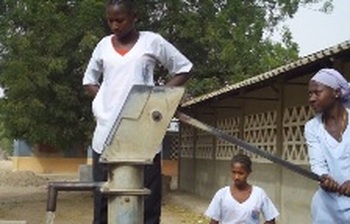
July 23, 2012
When a Peace Corps volunteer introduced me to Father Jean Diagne in 2009, he was parish priest for the up-country Bansang parish in the Central River Region of The Gambia. Since St. Therese's school at Fula Bantang was in his parish, and since he saw the welfare and education of the 800 students in this K-9 public school as part of his mission to help all the people of this largely Muslim parish, he visited the school nearly every day.
And so when he and I began working together on our scholarship program, it was only natural that we start with the school and families he knew best. And when Kebba Sanyang, already a minor legend among Peace Corps volunteers as a righteous and capable administrator, was named Principal there, we decided to focus most of our scholarship work on this remote up-country school and its students.
In a part of the world with so many issues to address, GambiaRising chose to focus primarily on providing financial support so that students whose families were not able to pay their school fees, could stay in school, especially girls in the higher grades. But that does not mean we are not interested in other kinds of support for the school and for the quality of their schooling.
So when a Seattle philanthropist told me in 2010 that she was bringing bicycles to The Gambia to donate to schools for students who lived so far away from school that it was a barrier to their staying in school, I encouraged her to visit St. Therese's and meet Kebba. She did so, and left ten bicycles with the school. Later last year I got a call from one of her donors, who had visited all the schools where bikes had been donated and had been impressed by what he saw at St.Therese's. A self-made American small business owner, he told me "I like to visit schools, unannounced, at 8 AM," he told me. "At most, at 8 AM teachers are making tea, students are playing. Not at St. Therese's. At 8 AM, the bell rang, students went to the classrooms, teachers were teaching. Kebba is running a tight ship."
Over the past year, this businessman and I have had many conversations; sometimes about bikes; sometimes about St. Therese's; sometimes about development in general. Although we have never met face to face (he lives in Wyoming), I consider him a friend. And working with Kebba Sanyang, with several contractors he has come to know in The Gambia, and with assistance from several Peace Corps volunteers in the area, his confidence in Kebba and his generosity have led to a number of wonderful outcomes.
1) The water pump at the school has been completely rebuilt; the school now has running water (here's a short video I took in January: http://www.youtube.com/watch?v=j-Ho9LdJJiI). (You can hear Father Jean and Kebba talking in the background.)
2) Twenty more bicycles have been donated to the school - ten more new ones from HopeFirst in Seattle, and ten purchased from the January Peace Corps auction of used bikes turned in by volunteers after their service was complete.
When a Peace Corps volunteer introduced me to Father Jean Diagne in 2009, he was parish priest for the up-country Bansang parish in the Central River Region of The Gambia. Since St. Therese's school at Fula Bantang was in his parish, and since he saw the welfare and education of the 800 students in this K-9 public school as part of his mission to help all the people of this largely Muslim parish, he visited the school nearly every day.
And so when he and I began working together on our scholarship program, it was only natural that we start with the school and families he knew best. And when Kebba Sanyang, already a minor legend among Peace Corps volunteers as a righteous and capable administrator, was named Principal there, we decided to focus most of our scholarship work on this remote up-country school and its students.
In a part of the world with so many issues to address, GambiaRising chose to focus primarily on providing financial support so that students whose families were not able to pay their school fees, could stay in school, especially girls in the higher grades. But that does not mean we are not interested in other kinds of support for the school and for the quality of their schooling.
So when a Seattle philanthropist told me in 2010 that she was bringing bicycles to The Gambia to donate to schools for students who lived so far away from school that it was a barrier to their staying in school, I encouraged her to visit St. Therese's and meet Kebba. She did so, and left ten bicycles with the school. Later last year I got a call from one of her donors, who had visited all the schools where bikes had been donated and had been impressed by what he saw at St.Therese's. A self-made American small business owner, he told me "I like to visit schools, unannounced, at 8 AM," he told me. "At most, at 8 AM teachers are making tea, students are playing. Not at St. Therese's. At 8 AM, the bell rang, students went to the classrooms, teachers were teaching. Kebba is running a tight ship."
Over the past year, this businessman and I have had many conversations; sometimes about bikes; sometimes about St. Therese's; sometimes about development in general. Although we have never met face to face (he lives in Wyoming), I consider him a friend. And working with Kebba Sanyang, with several contractors he has come to know in The Gambia, and with assistance from several Peace Corps volunteers in the area, his confidence in Kebba and his generosity have led to a number of wonderful outcomes.
1) The water pump at the school has been completely rebuilt; the school now has running water (here's a short video I took in January: http://www.youtube.com/watch?v=j-Ho9LdJJiI). (You can hear Father Jean and Kebba talking in the background.)
2) Twenty more bicycles have been donated to the school - ten more new ones from HopeFirst in Seattle, and ten purchased from the January Peace Corps auction of used bikes turned in by volunteers after their service was complete.
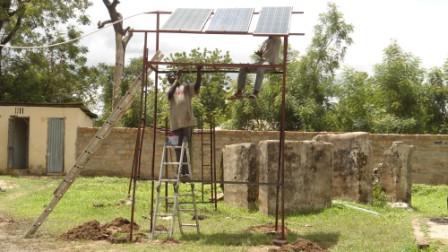
3) And as of this week, right up there with fresh water as a dramatic change, the school now has electricity. A small new solar system has been installed. Classrooms will have light; teachers can charge their cell phones. There will even be enough power to run a computer or two and a small DVD system.
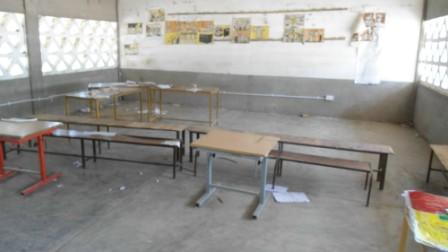
My old collection of educational and uplifting DVDs has been located at the Peace Corps offices and will be sent to the school for those long weekends when teachers formerly dreamed of moving to the city. (Believe it or not, when I asked Father Jean to discuss with Kebba what we could do to encourage good teachers to stay in this remote school; they replied: electricity.) Here are a few photos of the work done last week:
So while we continue to talk to everyone we know about how to expand our scholarship program, hoping to be able to support more students in the coming school year, the good activity at St. Therese's has encouraged others to help in ways we are not equipped to do. And so a virtuous circle continues to turn.
I hope you can be a part of it in the coming school year.
Mike McConnell
Managing Trustee
GambiaRising Charitable Trust
1500 Park Ave PH1
Emeryville, CA 94608
www.gambiarising.org
So while we continue to talk to everyone we know about how to expand our scholarship program, hoping to be able to support more students in the coming school year, the good activity at St. Therese's has encouraged others to help in ways we are not equipped to do. And so a virtuous circle continues to turn.
I hope you can be a part of it in the coming school year.
Mike McConnell
Managing Trustee
GambiaRising Charitable Trust
1500 Park Ave PH1
Emeryville, CA 94608
www.gambiarising.org
No Father's Day
June 16, 2012
The situation for women in The Gambia is far from ideal. Especially without education. Because, like most of the world, west Africa is a male-centric culture.
So the father's needs are the family's priority.
But what happens when the father dies?
The life expectancy of the average Gambian is 59 years; that's 154th on the U.N.'s list of 194 countries. (The United States is only 38th, with an average life expectancy of 78 years.)
The good news is that in 1970, life expectancy in The Gambia was only 38 years.
So the trend is good. And believe it or not, when people live longer, they actually have fewer children. One theory is that they expect their children to live, so they have fewer. Just ask the Japanese; they have the longest life expectancy in the world, and their population is declining.
Since many Gambians live to be quite old, the low averages speak more to the fact that so many die before their natural life span is over. You rarely hear a Gambian say how a family member died, unless it was from malaria; most deaths are undiagnosed. But when a Gambian father dies, the family suffers, and one of the first places that is felt is kids dropping out of school.
So this Father's Day, I want to introduce you to twenty-one of our students who either have no father or whose father is unknown to them, and who are in school today only with the support of GambiaRising's donors. Half of these have been sponsored by a specific GambiaRising donor, and the others are being supported from our general fund. I am certain that there are more in our program without fathers, but these are the ones I have detailed information on, and photos of.
For these young people, the support GambiaRising donors has given them has been literally life-changing.
So here's an idea for this Father's Day. Instead of buying that lovely new tie (or perhaps getting one), give or ask for the gift of life-changing education for a Gambian student who has no father. I can guarantee you this: it is a gift that will keep on giving.
Father Jean, Lamin, our Trustees, and I are volunteering our time, and Marilyn and I are paying the administrative and overhead costs, so 100% of your donation will go directly to support a student.
Don't forget our new monthly donation program; now donors can spread the support of a student over 12 months. So to support a student in grades K-6 is only $12,50 per month; senior secondary school (high school, which includes room and board) is only $25 per month. The full menu is at the bottom of this page: http://www.gambiarising.org/donate.html. If you are not in a position to help out now, considering forwarding this to someone who might.
Thanks so much.
And Happy Father's Day!
Mike McConnell
Managing Trustee
GambiaRising Charitable Trust
We have videos of ten fatherless students up on our GambiaScholars YouTube channel; if you want to view them, here are the links:
http://www.youtube.com/watch?v=QLI66Z0r4ls
http://www.youtube.com/watch?v=2JrTLcmGtKc
http://www.youtube.com/watch?v=5n_1zoANuZY
http://youtu.be/4EWfElt1Gy8
http://www.youtube.com/watch?v=5cq-NYM5g1M
http://www.youtube.com/watch?v=_GW8EUWkI5E
http://youtu.be/c5sEJPT2hCY
http://www.youtube.com/watch?v=PIocvF2ZLCU
http://www.youtube.com/watch?v=y4aMqEe-eHA
http://www.youtube.com/watch?v=NHHJA83R8JM
The situation for women in The Gambia is far from ideal. Especially without education. Because, like most of the world, west Africa is a male-centric culture.
So the father's needs are the family's priority.
But what happens when the father dies?
The life expectancy of the average Gambian is 59 years; that's 154th on the U.N.'s list of 194 countries. (The United States is only 38th, with an average life expectancy of 78 years.)
The good news is that in 1970, life expectancy in The Gambia was only 38 years.
So the trend is good. And believe it or not, when people live longer, they actually have fewer children. One theory is that they expect their children to live, so they have fewer. Just ask the Japanese; they have the longest life expectancy in the world, and their population is declining.
Since many Gambians live to be quite old, the low averages speak more to the fact that so many die before their natural life span is over. You rarely hear a Gambian say how a family member died, unless it was from malaria; most deaths are undiagnosed. But when a Gambian father dies, the family suffers, and one of the first places that is felt is kids dropping out of school.
So this Father's Day, I want to introduce you to twenty-one of our students who either have no father or whose father is unknown to them, and who are in school today only with the support of GambiaRising's donors. Half of these have been sponsored by a specific GambiaRising donor, and the others are being supported from our general fund. I am certain that there are more in our program without fathers, but these are the ones I have detailed information on, and photos of.
For these young people, the support GambiaRising donors has given them has been literally life-changing.
So here's an idea for this Father's Day. Instead of buying that lovely new tie (or perhaps getting one), give or ask for the gift of life-changing education for a Gambian student who has no father. I can guarantee you this: it is a gift that will keep on giving.
Father Jean, Lamin, our Trustees, and I are volunteering our time, and Marilyn and I are paying the administrative and overhead costs, so 100% of your donation will go directly to support a student.
Don't forget our new monthly donation program; now donors can spread the support of a student over 12 months. So to support a student in grades K-6 is only $12,50 per month; senior secondary school (high school, which includes room and board) is only $25 per month. The full menu is at the bottom of this page: http://www.gambiarising.org/donate.html. If you are not in a position to help out now, considering forwarding this to someone who might.
Thanks so much.
And Happy Father's Day!
Mike McConnell
Managing Trustee
GambiaRising Charitable Trust
We have videos of ten fatherless students up on our GambiaScholars YouTube channel; if you want to view them, here are the links:
http://www.youtube.com/watch?v=QLI66Z0r4ls
http://www.youtube.com/watch?v=2JrTLcmGtKc
http://www.youtube.com/watch?v=5n_1zoANuZY
http://youtu.be/4EWfElt1Gy8
http://www.youtube.com/watch?v=5cq-NYM5g1M
http://www.youtube.com/watch?v=_GW8EUWkI5E
http://youtu.be/c5sEJPT2hCY
http://www.youtube.com/watch?v=PIocvF2ZLCU
http://www.youtube.com/watch?v=y4aMqEe-eHA
http://www.youtube.com/watch?v=NHHJA83R8JM
Happy Not Mother’s Day from GambiaRising (with photos)
May 13, 2012
Here are the facts of life for a subsistence farmer in west Africa: There is no safety net. If you are lucky enough to live long enough to be old, you will live with the family of one of your sons. When your daughters are old enough to bear children, they will be "given in marriage" to someone who will pay you a dowry, which will be a little welcome income to help provide for the rest of your family. Your daughter will then be part of her husband's family and thereby, his parents' safety net. Often, the man who can pay a higher dowry will have more than one wife. The other wives will even sometimes encourage this, since it gives him a new sexual partner and takes pressure off them, and also gives them a new set of hands to help with the labor in the compound and on the farm.
This means that once she reaches puberty, a young Gambian girl is ever more likely to be given in marriage. It is usually not a happy occasion for her. But if you are a Gambian parent, with little income and several children, and school fees are eating up your little discretionary income, you simply have to allocate your funds to your son(s). And there is little upside to keeping your daughter in school; it is just an expense with no payback.
Unless someone says they will pay your daughter's school fees.
In the villages around Fula Bantang in the Central River Region, that is what GambiaRising is doing. Although our broader mission is to help any student who without our help, would not be able to stay in school, that formula has led more and more to supporting girls, and in particular, girls of child-bearing age.
Today, we have 114 students receiving financial support to stay in school.
Of those, 71 are in grades 9 or higher (fees and other costs go up as you rise through the grades so that is when students start to drop out).
Of those in grade 9 or higher, 62 are girls.
Girls who without our support, would most likely be married off by now, and in most cases, mothers.
So today I want to celebrate those girls who are breaking with tradition, and are getting an education past the point where anyone would expect them to do so. In most cases, they have sought us out and have bargained with their parents for the chance to stay in school, if only they can find someone to pay their fees.
I have photos of half the girls who are in school because of the generosity of GambiaRising's donors and share them with you below. There are still too few of us, and there are many more girls to help. But on this Mother's Day weekend, I want to celebrate these brave girls, and thank my friends who are helping them fulfill their dreams of an education. Each one of them has their own story. But their faces tell a story of its own. Please scroll down and look at them, and think about the difference our donors are making in their lives (even if the student being supported is a boy, you know that support frees up other funds to support a girl as well.)
One day most of these girls will be mothers. But not yet.
Father Jean is heading for Fula Bantang next week to pay the final school year bills for our students. This is time of the year when the income from last year's harvest has run out and students are most likely to drop out of school because they can't pay the final term's fees. I know he is going to call me next week and ask if we can support some more deserving students. If you have ever considered supporting a student, we now have a way that makes it easy: monthly payments. For as little as $12.50 per month, charged to your credit card or PayPal account, you can keep a Gambian student in school, and thereby change their life. 100% of your donation will go to paying their school fees and other direct school expenses. It is definitely one of the best payback investments I am aware of.
We can't expand this work without adding more hands pulling on the rope, but thanks to this new system, it doesn't have to hurt that much. Please consider it; the monthly payment button is at the bottom of this page: http://www.gambiarising.org/donate.html
Mike McConnell
GambiaRising
Here are the facts of life for a subsistence farmer in west Africa: There is no safety net. If you are lucky enough to live long enough to be old, you will live with the family of one of your sons. When your daughters are old enough to bear children, they will be "given in marriage" to someone who will pay you a dowry, which will be a little welcome income to help provide for the rest of your family. Your daughter will then be part of her husband's family and thereby, his parents' safety net. Often, the man who can pay a higher dowry will have more than one wife. The other wives will even sometimes encourage this, since it gives him a new sexual partner and takes pressure off them, and also gives them a new set of hands to help with the labor in the compound and on the farm.
This means that once she reaches puberty, a young Gambian girl is ever more likely to be given in marriage. It is usually not a happy occasion for her. But if you are a Gambian parent, with little income and several children, and school fees are eating up your little discretionary income, you simply have to allocate your funds to your son(s). And there is little upside to keeping your daughter in school; it is just an expense with no payback.
Unless someone says they will pay your daughter's school fees.
In the villages around Fula Bantang in the Central River Region, that is what GambiaRising is doing. Although our broader mission is to help any student who without our help, would not be able to stay in school, that formula has led more and more to supporting girls, and in particular, girls of child-bearing age.
Today, we have 114 students receiving financial support to stay in school.
Of those, 71 are in grades 9 or higher (fees and other costs go up as you rise through the grades so that is when students start to drop out).
Of those in grade 9 or higher, 62 are girls.
Girls who without our support, would most likely be married off by now, and in most cases, mothers.
So today I want to celebrate those girls who are breaking with tradition, and are getting an education past the point where anyone would expect them to do so. In most cases, they have sought us out and have bargained with their parents for the chance to stay in school, if only they can find someone to pay their fees.
I have photos of half the girls who are in school because of the generosity of GambiaRising's donors and share them with you below. There are still too few of us, and there are many more girls to help. But on this Mother's Day weekend, I want to celebrate these brave girls, and thank my friends who are helping them fulfill their dreams of an education. Each one of them has their own story. But their faces tell a story of its own. Please scroll down and look at them, and think about the difference our donors are making in their lives (even if the student being supported is a boy, you know that support frees up other funds to support a girl as well.)
One day most of these girls will be mothers. But not yet.
Father Jean is heading for Fula Bantang next week to pay the final school year bills for our students. This is time of the year when the income from last year's harvest has run out and students are most likely to drop out of school because they can't pay the final term's fees. I know he is going to call me next week and ask if we can support some more deserving students. If you have ever considered supporting a student, we now have a way that makes it easy: monthly payments. For as little as $12.50 per month, charged to your credit card or PayPal account, you can keep a Gambian student in school, and thereby change their life. 100% of your donation will go to paying their school fees and other direct school expenses. It is definitely one of the best payback investments I am aware of.
We can't expand this work without adding more hands pulling on the rope, but thanks to this new system, it doesn't have to hurt that much. Please consider it; the monthly payment button is at the bottom of this page: http://www.gambiarising.org/donate.html
Mike McConnell
GambiaRising
